Iran accounts for most global executions in 2024
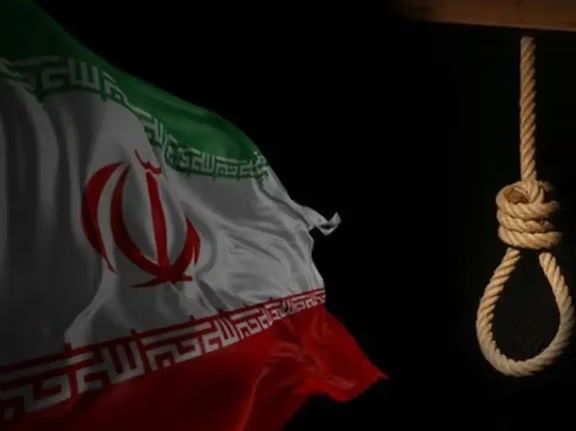
Iran led the world in executions this year, with at least 800 documented cases as of December 1, according to the Death Penalty Information Center (DPI).

Iran led the world in executions this year, with at least 800 documented cases as of December 1, according to the Death Penalty Information Center (DPI).
"Despite the overall global trend towards abolition, total known executions worldwide increased for the third consecutive year, led by Iran, Saudi Arabia, and Iraq," according to recent data from the DPI.
Nonviolent resistance efforts have started in response to Iran's ongoing use of the death penalty, as reported by the non-profit organization (NPO). One example is the weekly “No Death Penalty Tuesday” hunger strike by Iranian prisoners. This movement, first called “Black Tuesdays,” began on January 30, 2024. It was launched by 10 political prisoners in Karaj’s Ghezel Hesar Prison after several political prisoners were executed in January and weekly group executions occurred at the prison.
On Thursday, the United States sanctioned Iran’s Ghezel Hesar Prison, where hundreds of dissidents have faced torture and execution over the years.
“This prison saw severe human rights abuses, including cruel, inhuman, and degrading treatment of individuals in Iran who tried to exercise their right to free expression,” said US Secretary of State Antony Blinken on Thursday.
Earlier this year, the United States also sanctioned officials from Iran’s Prisons Organization for their role in suppressing protests after Mahsa Amini’s death in custody in September 2022.

Presidents Joe Biden and Donald Trump both failed to halt Iran’s march toward nuclear weapons, Representative Brad Sherman, one of the strongest Democratic voices in the US Congress opposing the Islamic Republic told Iran International.
A House Representative for 28 years and counting - much of that time as a senior member of the House Foreign Affairs committee - Sherman has disagreed with both presidents from both parties on their Iran policies.
An outspoken critic of Iran's Islamic rulers, Sherman champions legislation criticizing their treatment of the Iranian people and tightening sanctions.
The representative for swish Malibu and Bel Air in Los Angeles was one of a small handful of democrats that voted against the 2015 Joint Comprehensive Plan of Action (JCPOA), an agreement to limit the Iranian nuclear program in return for sanctions relief.
There had to be a better deal, he said.
“I disagreed with the JCPOA, but then under Trump, there was less intelligence being gathered by the IAEA and no diminution, " Sherman said of the UN nuclear watchdog which inspects Iranian facilities.
"While he put more pressure on the regime, he didn't slow down the nuclear program. And then we see Biden also not slowing down the nuclear program,” Sherman told the Eye for Iran podcast.
The Democratic congressman acknowledged the frustrations of some Iranian- American democrats who voted for Trump in November to apply maximum pressure on Iran, but said the president-elect's tough talk didn’t succeed either.
“I know opponents of the regime tend to like Trump's bravado and rhetorical stance, and certainly he shows more emotion against the regime than Biden does. But neither of them have stopped the centrifuges. Neither of them have stopped the murder of anyone who dares to raise their voice .”
The E3, a diplomatic coalition comprising of Germany, Britain and France released a statement Tuesday, expressing concern over Iran’s increased uranium enrichments, calling on Tehran to reverse its nuclear advancements.
The outgoing US Secretary of State Antony Blinken, addressing the Council of Foreign relations on Wednesday, said the clerical establishment may consider a nuclear weapon after setbacks in the region.
Blinken referred to Israel's ability to damage Tehran’s proxies and Iran’s military and defense capabilities in a direct strike in October.
The top US diplomat also said there’s still a chance for the incoming president to negotiate with Iran.
"I think there is the prospect of negotiations," Blinken said at the Council on Foreign Relations in New York, "I don't think that a nuclear weapon is inevitable."
But Sherman said the traditional Democratic view of showing restraint in negotiations is a big mistake when it comes to dealing with Iran.
“There are those in the Biden administration who think that by doing a little bit less, by some forbearance, they'll be able to negotiate,” said Sherman “No, this is a regime where if you're going to negotiate, you must do it from strength.”
Tougher Sanctions
To start, Sherman wants tougher sanctions on Iranian exports.
“We have now tougher sanctions on Russian exports than we have on Iran.”
America must redouble their efforts to curb Iran’s nuclear program according to Sherman, who also said the US should fund covert democracy groups fighting to topple the clerical establishment. He declined to elaborate.
“I've certainly supported everything we've done to help Democratic forces, and some of that is classified.”
While Sherman supports Republican President-elect Donald Trump's so-called negotiating through strength, he believes the Iranian system is determined to build a bomb.
“As long as there's an Islamic Republic of Iran, it will be a country seeking nuclear weapons.”
You can watch the full episode of Eye for Iran featuring congressman Brad Sherman on YouTube. Or you can listen on Spotify, Apple, CastBox or Amazon.
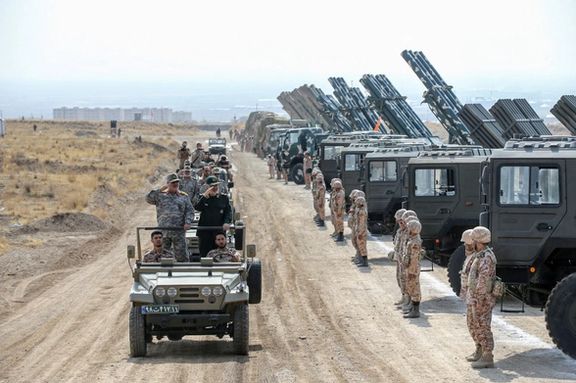
Hamas documents captured by Israel have uncovered details about Iran’s transnational routes through Syria, Lebanon, and the West Bank used to supply weapons to its allied groups, according to the Jerusalem Post.
The documents detail the collapse of a Hamas smuggling network in Jordan and how the group, along with Iran, attempted to transfer weapons to the West Bank to spark a new front against Israel.
It also highlights the involvement of Russia, despite being an ally of Iran, in disrupting smuggling operations in the Syria-Jordan-Israel border triangle, alongside measures by the US, Israel, and Jordan to block Iranian arms transfers through sanctions, airstrikes, and enhanced border controls.
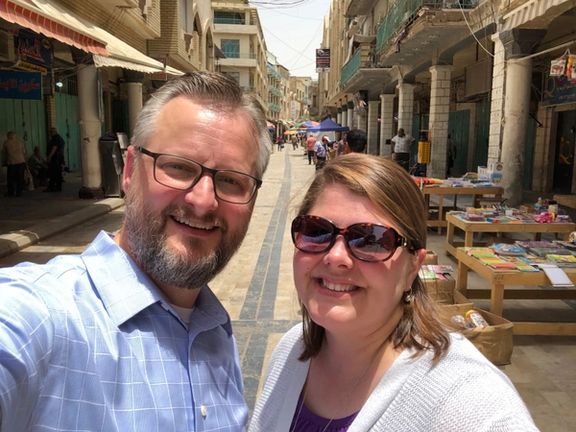
The US Justice Department on Friday charged a captain in Iran's Islamic Revolutionary Guard Corps (IRGC) with killing an American in the Iraqi capital Baghdad in 2022.
The murder and terrorism offenses against Mohammad Reza Nouri, 36, relate to the shooting death of Stephen Troell, 45, who worked at an English language institute in Iraq.
Troell was gunned down in Baghdad on Nov. 7 2022 while driving and accompanied by his wife. His last post on X was a selfie of the couple in Baghdad published June 11, 2018. "How much we loved visiting Baghdad!!! Iraq's treasure is its people," he wrote.
The complaint unsealed in a Manhattan federal court alleged the murder was Iran's retaliation for the killing of top IRGC commander Qassem Soleimani in a US drone strike in Baghdad in 2020.
"The Department of Justice will not tolerate terrorists and authoritarian regimes targeting and murdering Americans anywhere in the world," said Attorney General Merrick Garland in a statement.
"Stephen should still be alive today, and the Justice Department will work relentlessly to ensure accountability for his murder." he added.
Nouri is serving a life sentence in Iraq along with four Iraqis after being convicted there of Troell's murder. He had a played a key role in the targeting and killing of Troell, the complaint reads, including gathering information on Troell and his family.
Nouri is also alleged to have helped procure firearms and a vehicle for the operation. He believed Troell was an American or Israeli intelligence officer, according to the criminal complaint.
Minutes after the attack, he sent an encrypted message to another man involved. "The guys are fine?" he allegedly wrote.
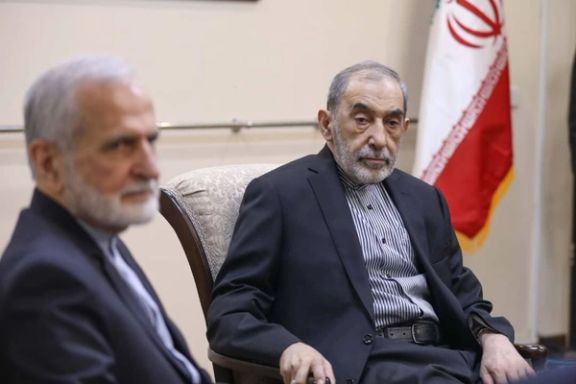
A prominent foreign policy advisor to Iran's Supreme Leader Ali Khamenei accused Turkey of working with the US and Israel to advance their influence in the Middle East.
“Turkey, in cooperation with America and Israel, has supported terrorist groups in Syria…Turkey also played a key role in facilitating the presence of US forces in the region and supported terrorist groups in Idlib,” Ali Velayati wrote in a commentary for the semi-official Mehr News Agency on Friday.
In what appeared to be a warning to Turkey, Velayati wrote, “Regional friends have been warned that any assistance in fueling conflicts will quickly backfire on them, and instead of trusting outsiders, they should stand with Muslims.”
The rivalry between regional powerhouses Turkey and Iran has heated up after Ankara emerged as a leading power broker in Syria following the downfall of Tehran's ally President Bashar al-Assad.
Earlier this week, Ahmad Khatami, a senior hardline Iranian cleric, blamed Turkey for Assad’s demise and warned Erdogan that he will face consequences.
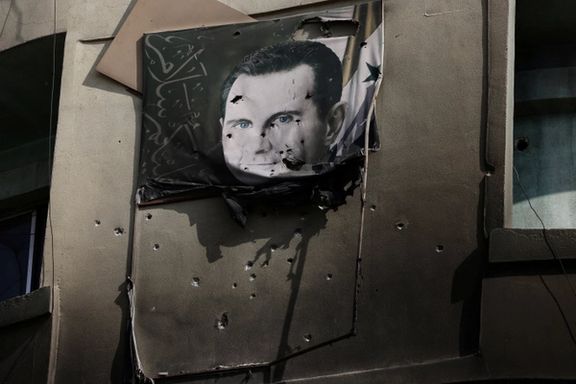
Iranian officials have been offering conflicting rationales for Iran's hasty exit from Syria as establishment voices begin to come to terms with one of the Islamic Republic's biggest ever strategic setbacks.
Defenders of official policy even went as far as slamming Iran's top great power ally Vladimir Putin for saying 4,000 Iranian troops needed a Russian airlift to depart.
"Liar," government-controlled media Nameh News branded the Russian President.
A senior military figure protested that those airlifted to Tehran were not Iranian or were not military personnel. Still others have defended Iran's support for and defense of Assad and at least one has denied Iran's military presence in Assad's Syria altogether.
Ali Akbar Ahmadian the Secretary of the Islamic Republic's Supreme Council of National Security insisted that Iranian troops were present only as military advisers.
The statement is contrary to copious Iranian state TV footage in the past that showed Iranian IRGC forces engaged in combat in Syria.
"Iran's military presence outside the country is based on Tehran's national interests, non-intervention in the internal affairs of the host countries," Ahmadian added. "Iran never starts an invasion."
Iranian and Russia forces participated in large-scale assaults and air strikes against population centers, including Syria’s second largest city, Aleppo during the civil war.
The conflict involved government forces opposed by religious and secular opposition fighters. Assad was ultimately toppled by a rebel coalition spearheaded by a radical Islamist group that was once an Al Qaeda affiliate.
Ahmadian made a rare concession about the true nature of Iran's erstwhile ally, however.
"Part of Assad's political system showed a detestable behavior against the people of that country and that brought about a divide between the Syrian government and people."
Ebrahim Rezaei the spokesperson for the Iranian parliament's National Security Committee told the press that "Assad's regime would have fallen much earlier if it were not for our resistance."
"Iran's presence in Syria was aimed at protecting the axis of resistance rather than Assad as an individual," he added."We fought terrorists such as ISIS and some of our men were killed in action in Syria."
Islamic Revolutionary Guard Corps (IRGC) General Esmail Kowsari, a member of the Iranian parliament's National Security Committee said Tehran did not station so many troops in Syria to have needed a massive Russian airlift.
"Iran never had 4,000 troops in Syria. Those who were evacuated were Lebanese and Afghan military advisers as well as individuals from some other countries."
Iran organized Afghan, Pakistani and Iraqi militiamen to fight alongside Assads forces for a decade.
The Afghan fighters receive citizenship or residency in Iran and were buried there with honors when they were killed in Syria.
"The reason we did not evacuate them earlier was that we expected the Syrian army to show some resistance. But neither the army nor Bashar Assad did so," Kowsari added. "We even told Iranian teachers in Syria to return to Iran via Lebanon."
Iran's clerical establishment also sought to blame Assad's forces.
Hashem Hosseini Bushehri the Friday Prayers Imam of Qom and a member of the Assembly of Experts also said in one of his sermons: "Neither Bashar nor the Syrian army had any motivation to fight, and Iran was not able to do anything under the circumstances as Syria's ground and air borders were closed."
Iran had warned Assad, he said, that fighters were being trained in Idlib but Tehran's counsels fell on deaf ears.